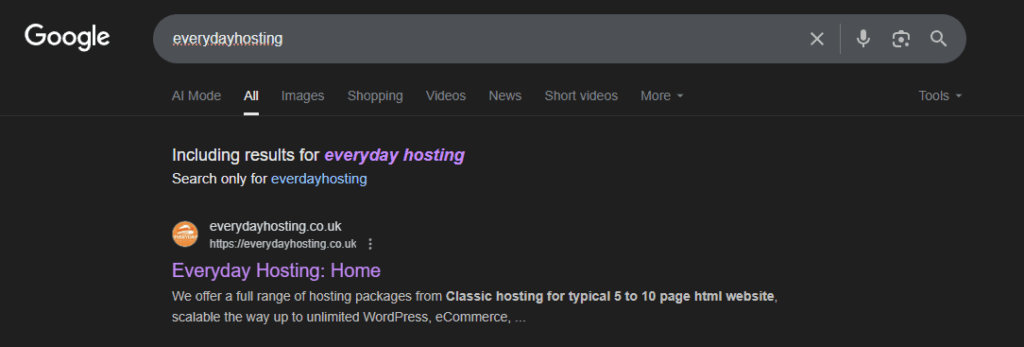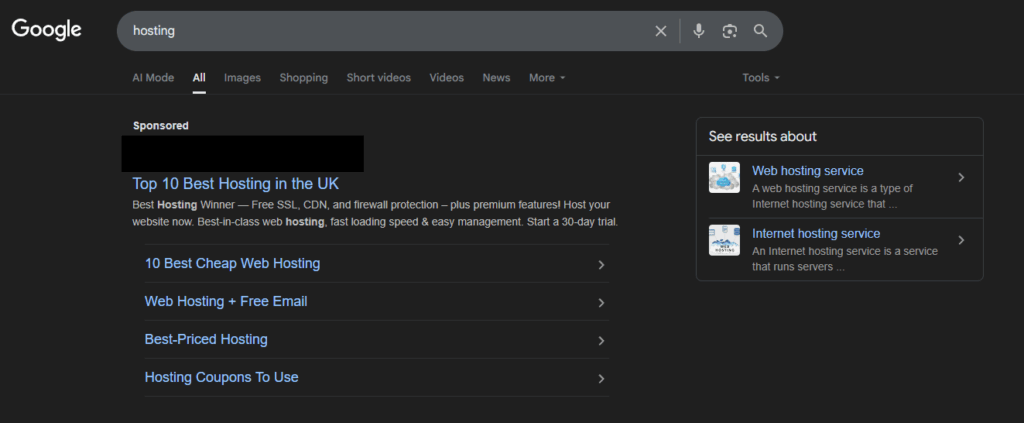Search Engine Optimisation (SEO) Overview
- Home
- Starting a Business
- Search Engine Optimisation (SEO) Overview
Search Engine Optimisation (SEO) Overview
For Websites, people clicking onto your website is crucial for your business’s success. SEO stands for Search Engine Optimisation and relates to how much traffic your website gets from users searching for products/services that you offer as a business. Such as if you beibg found for website hosting and domain names when someone searches for it, your site should be one of the first there.
For example:

Ideally you would aim to have your site within the first two pages. After that users tend to get disinterested or are looking for a very niche service or product.
Improving Your SEO -
There is a variety of ways to improve your organic SEO, including:
- Adding titles and headers to your site
- Using relevant key words
- Creating content (such as blogs!)
- Use metadescriptions
- Create a multi-device friendly site
Organic SEO differs from how most larger companies boost their SEO, as it can be less effective than paying a browser to place you higher in the list –

Many sites can still be found on the first or second page just with Organic SEO so properly executing how you advertise is still paramount to have success in the large database of all the other websites
Another important strategy to improve your SEO, would be including your own social media accounts on your website as it’s boosting your engagement online, hopefully generating clicks which would influence your position on the list. Something that is noteworthy is also to consider which social media app you use for your business as some services and/or products don’t correlate with the platform you might be using. Such as financial services on instagram for example.
When you create your website SEO is always vital to your business and should be refined and continuously improved upon as to not look unactive by the browser. SEO in a simple conclusion, is just appealing to the browsers algorithim.
For more information on creating website visit here:
How to Build Your Own Website – Easy As Pie
Organic and paid search are two distinct ways to drive traffic to a website through search engines. Organic search, also known as search engine optimization (SEO), involves optimizing a website to rank higher in unpaid search results. Paid search, also known as search engine marketing (SEM) or pay-per-click (PPC) advertising, involves paying for prominent placement in search results.
- How it works:
SEO focuses on improving a website’s visibility in search engine results pages (SERPs) by optimizing content, website structure, and other factors to appeal to search engine algorithms.
- Cost:
SEO is not a direct cost per click. Instead, it involves an investment in time and resources to optimize the website.
- Benefits:
- Long-term visibility and sustainable traffic growth.
- Increased credibility and trust with users.
- Cost-effective in the long run, as it doesn’t require ongoing per-click payments.
- Long-term visibility and sustainable traffic growth.
- Challenges:
- Requires consistent effort and time to see results.
- Algorithm changes can impact rankings.
- May require significant content creation and optimization efforts.
- Requires consistent effort and time to see results.
- How it works:
Paid search involves creating and running advertising campaigns where you pay a fee each time a user clicks on your ad.
- Cost:
Paid search is a direct cost per click, where you pay a pre-determined amount each time someone clicks on your ad.
- Benefits:
- Immediate visibility and traffic generation.
- Targeted audience reach through keyword and demographic targeting.
- Measurable results and campaign performance tracking.
- Immediate visibility and traffic generation.
- Challenges:
- Can be expensive, especially in competitive industries.
- Requires ongoing budget and management to maintain results.
- May not build the same level of trust as organic results.
- Can be expensive, especially in competitive industries.
In essence, organic search focuses on building a strong, trustworthy online presence over time, while paid search provides a more immediate and targeted way to reach potential customers.